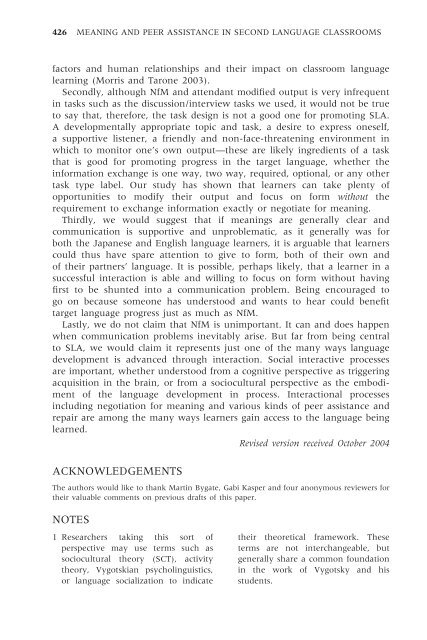Negotiation for Meaning and Peer Assistance in Second Language ...
Negotiation for Meaning and Peer Assistance in Second Language ...
Negotiation for Meaning and Peer Assistance in Second Language ...
Create successful ePaper yourself
Turn your PDF publications into a flip-book with our unique Google optimized e-Paper software.
426 MEANING AND PEER ASSISTANCE IN SECOND LANGUAGE CLASSROOMS<br />
factors <strong>and</strong> human relationships <strong>and</strong> their impact on classroom language<br />
learn<strong>in</strong>g (Morris <strong>and</strong> Tarone 2003).<br />
<strong>Second</strong>ly, although NfM <strong>and</strong> attendant modified output is very <strong>in</strong>frequent<br />
<strong>in</strong> tasks such as the discussion/<strong>in</strong>terview tasks we used, it would not be true<br />
to say that, there<strong>for</strong>e, the task design is not a good one <strong>for</strong> promot<strong>in</strong>g SLA.<br />
A developmentally appropriate topic <strong>and</strong> task, a desire to express oneself,<br />
a supportive listener, a friendly <strong>and</strong> non-face-threaten<strong>in</strong>g environment <strong>in</strong><br />
which to monitor one’s own output—these are likely <strong>in</strong>gredients of a task<br />
that is good <strong>for</strong> promot<strong>in</strong>g progress <strong>in</strong> the target language, whether the<br />
<strong>in</strong><strong>for</strong>mation exchange is one way, two way, required, optional, or any other<br />
task type label. Our study has shown that learners can take plenty of<br />
opportunities to modify their output <strong>and</strong> focus on <strong>for</strong>m without the<br />
requirement to exchange <strong>in</strong><strong>for</strong>mation exactly or negotiate <strong>for</strong> mean<strong>in</strong>g.<br />
Thirdly, we would suggest that if mean<strong>in</strong>gs are generally clear <strong>and</strong><br />
communication is supportive <strong>and</strong> unproblematic, as it generally was <strong>for</strong><br />
both the Japanese <strong>and</strong> English language learners, it is arguable that learners<br />
could thus have spare attention to give to <strong>for</strong>m, both of their own <strong>and</strong><br />
of their partners’ language. It is possible, perhaps likely, that a learner <strong>in</strong> a<br />
successful <strong>in</strong>teraction is able <strong>and</strong> will<strong>in</strong>g to focus on <strong>for</strong>m without hav<strong>in</strong>g<br />
first to be shunted <strong>in</strong>to a communication problem. Be<strong>in</strong>g encouraged to<br />
go on because someone has understood <strong>and</strong> wants to hear could benefit<br />
target language progress just as much as NfM.<br />
Lastly, we do not claim that NfM is unimportant. It can <strong>and</strong> does happen<br />
when communication problems <strong>in</strong>evitably arise. But far from be<strong>in</strong>g central<br />
to SLA, we would claim it represents just one of the many ways language<br />
development is advanced through <strong>in</strong>teraction. Social <strong>in</strong>teractive processes<br />
are important, whether understood from a cognitive perspective as trigger<strong>in</strong>g<br />
acquisition <strong>in</strong> the bra<strong>in</strong>, or from a sociocultural perspective as the embodiment<br />
of the language development <strong>in</strong> process. Interactional processes<br />
<strong>in</strong>clud<strong>in</strong>g negotiation <strong>for</strong> mean<strong>in</strong>g <strong>and</strong> various k<strong>in</strong>ds of peer assistance <strong>and</strong><br />
repair are among the many ways learners ga<strong>in</strong> access to the language be<strong>in</strong>g<br />
learned.<br />
Revised version received October 2004<br />
ACKNOWLEDGEMENTS<br />
The authors would like to thank Mart<strong>in</strong> Bygate, Gabi Kasper <strong>and</strong> four anonymous reviewers <strong>for</strong><br />
their valuable comments on previous drafts of this paper.<br />
NOTES<br />
1 Researchers tak<strong>in</strong>g this sort of<br />
perspective may use terms such as<br />
sociocultural theory (SCT), activity<br />
theory, Vygotskian psychol<strong>in</strong>guistics,<br />
or language socialization to <strong>in</strong>dicate<br />
their theoretical framework. These<br />
terms are not <strong>in</strong>terchangeable, but<br />
generally share a common foundation<br />
<strong>in</strong> the work of Vygotsky <strong>and</strong> his<br />
students.














